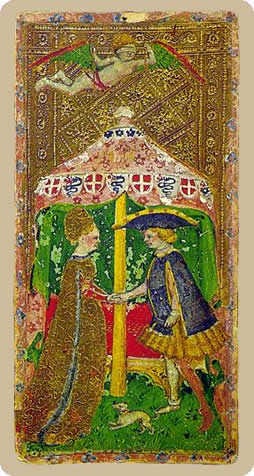The Lovers: It’s not About Love…or is it?
How the power of choice shapes who we are and finding what we truly want
Aside from the Devil, I find that no card is as commonly misunderstood in Tarot as the Lovers. Why is this the case, and what does it reveal about humans that so many of us want to project a person onto the Lovers card rather than see it as a reflection of ourselves? Why are we always searching for our soulmate or twin flame? Believing that once we find the other, we will feel whole and complete. When the truth is, we cannot manifest on the outside what we lack within.
As above, so below. Or should I say, the world we experience inward is the world we reflect out.
*Warning: Grief, trauma, and loss are all discussed in this blog post.*
The Lovers from the original Visconti Tarot Deck (est. 1550s)
Matchmaker, matchmaker, bring me a match…
Look, it’s no secret that we all desire love and companionship. Throughout history, many of the most epic stories, myths, and poems have centered around the pursuit of romantic love. Romeo and Juliet, Anthony and Cleopatra, Lancelot and Guinevere, Helen of Troy, Orpheus and Eurydice, Inanna/Ishtar and Dumuzi…these are just a few examples.
In my experience as a psychotherapist, there are very few things that have such a profound psychological effect on us as the pursuit of love. Perhaps the only experiences that come close are when an individual has experienced trauma or grief, both of which involve tremendous loss. These are life-altering. One is not the same after a trauma or loss has occurred, and much of the work in session is learning how to grieve the loss and come to terms with the newly integrated self, which has had to develop as a result of the experience.
This can mimic how one might feel after a life-altering love experience. In working with clients and processing my own relationship endings, individuals will often report symptoms of depression, anxiety, anhedonia, difficulty sleeping or oversleeping, overeating or undereating, substance use, or other compulsive avoidance behaviors such as workaholism, and intrusive memories of the past relationship. All of which can mimic what we as psychotherapists traditionally think of as potential indicators for trauma or bereavement within the DSM.
However, I find that when working with trauma or grief/loss, they differ from love in one fundamental way. Trauma and grief often involve a lack of choice, whereas love, like the Lovers card, is all about choice. In fact, that is the hallmark of grief and trauma. They are the result of something that happened in our lives that we didn’t choose. We don’t choose for our loved ones to die or for our children to move far away from us. We don’t wish to be terminated from our jobs prematurely or watch a parent’s health decline as a result of Alzheimer’s or old age. We don’t choose to be in car accidents or other traumatic incidents. We don’t choose to suffer through survivors’ guilt of watching our friends and loved ones perish in war and/or as a result of natural disasters. And we definitely do not choose to lose our body autonomy or feelings of self-agency when someone violates our physical and emotional safety. Even if that person is someone we knew, loved, and trusted to keep us safe.
All these situations imply a lack of choice, which is precisely why they are so challenging to process and integrate. Choice is a powerful thing, and that is precisely what the Lovers card is meant to teach us.
Keep reading with a 7-day free trial
Subscribe to The Dark Fairy Godmother to keep reading this post and get 7 days of free access to the full post archives.





